[English] 日本語
 Yorodumi
Yorodumi- EMDB-7113: Cryo-EM structure of human CPSF-160-WDR33 complex at 3.36 A resolution -
+ Open data
Open data
- Basic information
Basic information
| Entry | Database: EMDB / ID: EMD-7113 | |||||||||
|---|---|---|---|---|---|---|---|---|---|---|
| Title | Cryo-EM structure of human CPSF-160-WDR33 complex at 3.36 A resolution | |||||||||
 Map data Map data | Human CPSF160-WDR33 complex | |||||||||
 Sample Sample |
| |||||||||
 Keywords Keywords | polyadenylation / scaffolding protein / WD40 / PROTEIN BINDING | |||||||||
| Function / homology |  Function and homology information Function and homology informationco-transcriptional RNA 3'-end processing, cleavage and polyadenylation pathway / Processing of Intronless Pre-mRNAs / mRNA cleavage and polyadenylation specificity factor complex / collagen trimer / mRNA 3'-UTR AU-rich region binding / mRNA 3'-end processing / Transport of Mature mRNA Derived from an Intronless Transcript / mRNA 3'-end processing / tRNA processing in the nucleus / DNA damage tolerance ...co-transcriptional RNA 3'-end processing, cleavage and polyadenylation pathway / Processing of Intronless Pre-mRNAs / mRNA cleavage and polyadenylation specificity factor complex / collagen trimer / mRNA 3'-UTR AU-rich region binding / mRNA 3'-end processing / Transport of Mature mRNA Derived from an Intronless Transcript / mRNA 3'-end processing / tRNA processing in the nucleus / DNA damage tolerance / RNA Polymerase II Transcription Termination / Processing of Capped Intron-Containing Pre-mRNA / fibrillar center / mRNA processing / spermatogenesis / enzyme binding / RNA binding / nucleoplasm / nucleus Similarity search - Function | |||||||||
| Biological species |  Homo sapiens (human) Homo sapiens (human) | |||||||||
| Method | single particle reconstruction / cryo EM / Resolution: 3.36 Å | |||||||||
 Authors Authors | Sun Y / Zhang Y | |||||||||
| Funding support |  United States, 1 items United States, 1 items
| |||||||||
 Citation Citation |  Journal: Proc Natl Acad Sci U S A / Year: 2018 Journal: Proc Natl Acad Sci U S A / Year: 2018Title: Molecular basis for the recognition of the human AAUAAA polyadenylation signal. Authors: Yadong Sun / Yixiao Zhang / Keith Hamilton / James L Manley / Yongsheng Shi / Thomas Walz / Liang Tong /  Abstract: Nearly all eukaryotic messenger RNA precursors must undergo cleavage and polyadenylation at their 3'-end for maturation. A crucial step in this process is the recognition of the AAUAAA ...Nearly all eukaryotic messenger RNA precursors must undergo cleavage and polyadenylation at their 3'-end for maturation. A crucial step in this process is the recognition of the AAUAAA polyadenylation signal (PAS), and the molecular mechanism of this recognition has been a long-standing problem. Here, we report the cryo-electron microscopy structure of a quaternary complex of human CPSF-160, WDR33, CPSF-30, and an AAUAAA RNA at 3.4-Å resolution. Strikingly, the AAUAAA PAS assumes an unusual conformation that allows this short motif to be bound directly by both CPSF-30 and WDR33. The A1 and A2 bases are recognized specifically by zinc finger 2 (ZF2) of CPSF-30 and the A4 and A5 bases by ZF3. Interestingly, the U3 and A6 bases form an intramolecular Hoogsteen base pair and directly contact WDR33. CPSF-160 functions as an essential scaffold and preorganizes CPSF-30 and WDR33 for high-affinity binding to AAUAAA. Our findings provide an elegant molecular explanation for how PAS sequences are recognized for mRNA 3'-end formation. | |||||||||
| History |
|
- Structure visualization
Structure visualization
| Movie |
 Movie viewer Movie viewer |
|---|---|
| Structure viewer | EM map:  SurfView SurfView Molmil Molmil Jmol/JSmol Jmol/JSmol |
| Supplemental images |
- Downloads & links
Downloads & links
-EMDB archive
| Map data |  emd_7113.map.gz emd_7113.map.gz | 24.3 MB |  EMDB map data format EMDB map data format | |
|---|---|---|---|---|
| Header (meta data) |  emd-7113-v30.xml emd-7113-v30.xml emd-7113.xml emd-7113.xml | 15.7 KB 15.7 KB | Display Display |  EMDB header EMDB header |
| Images |  emd_7113.png emd_7113.png | 62.9 KB | ||
| Filedesc metadata |  emd-7113.cif.gz emd-7113.cif.gz | 6.9 KB | ||
| Archive directory |  http://ftp.pdbj.org/pub/emdb/structures/EMD-7113 http://ftp.pdbj.org/pub/emdb/structures/EMD-7113 ftp://ftp.pdbj.org/pub/emdb/structures/EMD-7113 ftp://ftp.pdbj.org/pub/emdb/structures/EMD-7113 | HTTPS FTP |
-Related structure data
| Related structure data |  6blyMC  7112C  7114C  6bm0C  6dnhC C: citing same article ( M: atomic model generated by this map |
|---|---|
| Similar structure data |
- Links
Links
| EMDB pages |  EMDB (EBI/PDBe) / EMDB (EBI/PDBe) /  EMDataResource EMDataResource |
|---|---|
| Related items in Molecule of the Month |
- Map
Map
| File |  Download / File: emd_7113.map.gz / Format: CCP4 / Size: 27 MB / Type: IMAGE STORED AS FLOATING POINT NUMBER (4 BYTES) Download / File: emd_7113.map.gz / Format: CCP4 / Size: 27 MB / Type: IMAGE STORED AS FLOATING POINT NUMBER (4 BYTES) | ||||||||||||||||||||||||||||||||||||||||||||||||||||||||||||
|---|---|---|---|---|---|---|---|---|---|---|---|---|---|---|---|---|---|---|---|---|---|---|---|---|---|---|---|---|---|---|---|---|---|---|---|---|---|---|---|---|---|---|---|---|---|---|---|---|---|---|---|---|---|---|---|---|---|---|---|---|---|
| Annotation | Human CPSF160-WDR33 complex | ||||||||||||||||||||||||||||||||||||||||||||||||||||||||||||
| Projections & slices | Image control
Images are generated by Spider. | ||||||||||||||||||||||||||||||||||||||||||||||||||||||||||||
| Voxel size | X=Y=Z: 1.07 Å | ||||||||||||||||||||||||||||||||||||||||||||||||||||||||||||
| Density |
| ||||||||||||||||||||||||||||||||||||||||||||||||||||||||||||
| Symmetry | Space group: 1 | ||||||||||||||||||||||||||||||||||||||||||||||||||||||||||||
| Details | EMDB XML:
CCP4 map header:
| ||||||||||||||||||||||||||||||||||||||||||||||||||||||||||||
-Supplemental data
- Sample components
Sample components
-Entire : Binary complex of human CPSF-160-WDR33
| Entire | Name: Binary complex of human CPSF-160-WDR33 |
|---|---|
| Components |
|
-Supramolecule #1: Binary complex of human CPSF-160-WDR33
| Supramolecule | Name: Binary complex of human CPSF-160-WDR33 / type: complex / ID: 1 / Parent: 0 / Macromolecule list: all |
|---|---|
| Source (natural) | Organism:  Homo sapiens (human) Homo sapiens (human) |
| Molecular weight | Theoretical: 225 KDa |
-Macromolecule #1: Cleavage and polyadenylation specificity factor subunit 1
| Macromolecule | Name: Cleavage and polyadenylation specificity factor subunit 1 type: protein_or_peptide / ID: 1 / Number of copies: 1 / Enantiomer: LEVO |
|---|---|
| Source (natural) | Organism:  Homo sapiens (human) Homo sapiens (human) |
| Molecular weight | Theoretical: 161.074234 KDa |
| Recombinant expression | Organism:  Trichoplusia ni (cabbage looper) Trichoplusia ni (cabbage looper) |
| Sequence | String: MYAVYKQAHP PTGLEFSMYC NFFNNSERNL VVAGTSQLYV YRLNRDAEAL TKNDRSTEGK AHREKLELAA SFSFFGNVMS MASVQLAGA KRDALLLSFK DAKLSVVEYD PGTHDLKTLS LHYFEEPELR DGFVQNVHTP RVRVDPDGRC AAMLVYGTRL V VLPFRRES ...String: MYAVYKQAHP PTGLEFSMYC NFFNNSERNL VVAGTSQLYV YRLNRDAEAL TKNDRSTEGK AHREKLELAA SFSFFGNVMS MASVQLAGA KRDALLLSFK DAKLSVVEYD PGTHDLKTLS LHYFEEPELR DGFVQNVHTP RVRVDPDGRC AAMLVYGTRL V VLPFRRES LAEEHEGLVG EGQRSSFLPS YIIDVRALDE KLLNIIDLQF LHGYYEPTLL ILFEPNQTWP GRVAVRQDTC SI VAISLNI TQKVHPVIWS LTSLPFDCTQ ALAVPKPIGG VVVFAVNSLL YLNQSVPPYG VALNSLTTGT TAFPLRTQEG VRI TLDCAQ ATFISYDKMV ISLKGGEIYV LTLITDGMRS VRAFHFDKAA ASVLTTSMVT MEPGYLFLGS RLGNSLLLKY TEKL QEPPA SAVREAADKE EPPSKKKRVD ATAGWSAAGK SVPQDEVDEI EVYGSEAQSG TQLATYSFEV CDSILNIGPC ANAAV GEPA FLSEEFQNSP EPDLEIVVCS GHGKNGALSV LQKSIRPQVV TTFELPGCYD MWTVIAPVRK EEEDNPKGEG TEQEPS TTP EADDDGRRHG FLILSREDST MILQTGQEIM ELDTSGFATQ GPTVFAGNIG DNRYIVQVSP LGIRLLEGVN QLHFIPV DL GAPIVQCAVA DPYVVIMSAE GHVTMFLLKS DSYGGRHHRL ALHKPPLHHQ SKVITLCLYR DLSGMFTTES RLGGARDE L GGRSGPEAEG LGSETSPTVD DEEEMLYGDS GSLFSPSKEE ARRSSQPPAD RDPAPFRAEP THWCLLVREN GTMEIYQLP DWRLVFLVKN FPVGQRVLVD SSFGQPTTQG EARREEATRQ GELPLVKEVL LVALGSRQSR PYLLVHVDQE LLIYEAFPHD SQLGQGNLK VRFKKVPHNI NFREKKPKPS KKKAEGGGAE EGAGARGRVA RFRYFEDIYG YSGVFICGPS PHWLLVTGRG A LRLHPMAI DGPVDSFAPF HNVNCPRGFL YFNRQGELRI SVLPAYLSYD APWPVRKIPL RCTAHYVAYH VESKVYAVAT ST NTPCARI PRMTGEEKEF ETIERDERYI HPQQEAFSIQ LISPVSWEAI PNARIELQEW EHVTCMKTVS LRSEETVSGL KGY VAAGTC LMQGEEVTCR GRILIMDVIE VVPEPGQPLT KNKFKVLYEK EQKGPVTALC HCNGHLVSAI GQKIFLWSLR ASEL TGMAF IDTQLYIHQM ISVKNFILAA DVMKSISLLR YQEESKTLSL VSRDAKPLEV YSVDFMVDNA QLGFLVSDRD RNLMV YMYL PEAKESFGGM RLLRRADFHV GAHVNTFWRT PCRGATEGLS KKSVVWENKH ITWFATLDGG IGLLLPMQEK TYRRLL MLQ NALTTMLPHH AGLNPRAFRM LHVDRRTLQN AVRNVLDGEL LNRYLYLSTM ERSELAKKIG TTPDIILDDL LETDRVT AH F UniProtKB: Cleavage and polyadenylation specificity factor subunit 1 |
-Macromolecule #2: pre-mRNA 3' end processing protein WDR33
| Macromolecule | Name: pre-mRNA 3' end processing protein WDR33 / type: protein_or_peptide / ID: 2 / Number of copies: 1 / Enantiomer: LEVO |
|---|---|
| Source (natural) | Organism:  Homo sapiens (human) Homo sapiens (human) |
| Molecular weight | Theoretical: 67.546812 KDa |
| Recombinant expression | Organism:  Trichoplusia ni (cabbage looper) Trichoplusia ni (cabbage looper) |
| Sequence | String: MGSSHHHHHH SSGLVMATEI GSPPRFFHMP RFQHQAPRQL FYKRPDFAQQ QAMQQLTFDG KRMRKAVNRK TIDYNPSVIK YLENRIWQR DQRDMRAIQP DAGYYNDLVP PIGMLNNPMN AVTTKFVRTS TNKVKCPVFV VRWTPEGRRL VTGASSGEFT L WNGLTFNF ...String: MGSSHHHHHH SSGLVMATEI GSPPRFFHMP RFQHQAPRQL FYKRPDFAQQ QAMQQLTFDG KRMRKAVNRK TIDYNPSVIK YLENRIWQR DQRDMRAIQP DAGYYNDLVP PIGMLNNPMN AVTTKFVRTS TNKVKCPVFV VRWTPEGRRL VTGASSGEFT L WNGLTFNF ETILQAHDSP VRAMTWSHND MWMLTADHGG YVKYWQSNMN NVKMFQAHKE AIREASFSPT DNKFATCSDD GT VRIWDFL RCHEERILRG HGADVKCVDW HPTKGLVVSG SKDSQQPIKF WDPKTGQSLA TLHAHKNTVM EVKLNLNGNW LLT ASRDHL CKLFDIRNLK EELQVFRGHK KEATAVAWHP VHEGLFASGG SDGSLLFWHV GVEKEVGGME MAHEGMIWSL AWHP LGHIL CSGSNDHTSK FWTRNRPGDK MRDRYNLNLL PGMSEDGVEY DDLEPNSLAV IPGMGIPEQL KLAMEQEQMG KDESN EIEM TIPGLDWGME EVMQKDQKKV PQKKVPYAKP IPAQFQQAWM QNKVPIPAPN EVLNDRKEDI KLEEKKKTQA EIEQEM ATL QYTNPQLLEQ LKIERLAQKQ VEQI UniProtKB: pre-mRNA 3' end processing protein WDR33 |
-Experimental details
-Structure determination
| Method | cryo EM |
|---|---|
 Processing Processing | single particle reconstruction |
| Aggregation state | particle |
- Sample preparation
Sample preparation
| Concentration | 0.18 mg/mL |
|---|---|
| Buffer | pH: 7.9 / Component - Concentration: 0.38 mM / Component - Formula: NaCl / Component - Name: sodium chloride / Details: 25 mM Tris-HCl, pH 7.9, 380 mM NaCl, 5mM DTT |
| Grid | Model: Quantifoil R1.2/1.3 / Material: GOLD / Support film - Material: CARBON / Support film - topology: HOLEY / Pretreatment - Type: GLOW DISCHARGE |
| Vitrification | Cryogen name: ETHANE / Chamber humidity: 100 % / Chamber temperature: 277 K / Instrument: FEI VITROBOT MARK IV |
- Electron microscopy
Electron microscopy
| Microscope | FEI TITAN KRIOS |
|---|---|
| Image recording | Film or detector model: GATAN K2 SUMMIT (4k x 4k) / Detector mode: COUNTING / Digitization - Frames/image: 1-40 / Number grids imaged: 1 / Number real images: 2468 / Average exposure time: 10.0 sec. / Average electron dose: 70.0 e/Å2 |
| Electron beam | Acceleration voltage: 300 kV / Electron source:  FIELD EMISSION GUN FIELD EMISSION GUN |
| Electron optics | C2 aperture diameter: 100.0 µm / Calibrated defocus max: 2.8000000000000003 µm / Calibrated defocus min: 0.9 µm / Calibrated magnification: 46729 / Illumination mode: FLOOD BEAM / Imaging mode: BRIGHT FIELD / Cs: 2.7 mm / Nominal defocus max: 2.5 µm / Nominal defocus min: 1.2 µm / Nominal magnification: 225000 |
| Sample stage | Specimen holder model: FEI TITAN KRIOS AUTOGRID HOLDER / Cooling holder cryogen: NITROGEN |
| Experimental equipment |  Model: Titan Krios / Image courtesy: FEI Company |
 Movie
Movie Controller
Controller


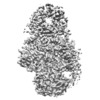
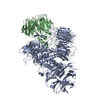

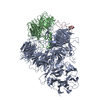
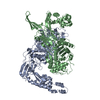

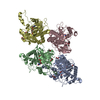
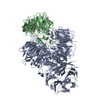
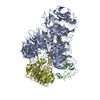

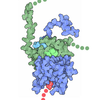
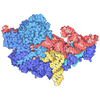
 Z (Sec.)
Z (Sec.) Y (Row.)
Y (Row.) X (Col.)
X (Col.)





















